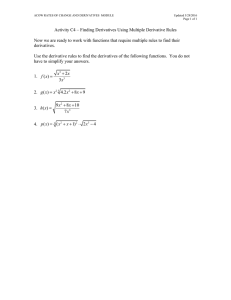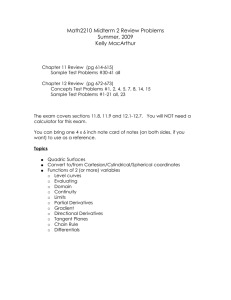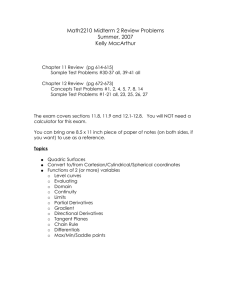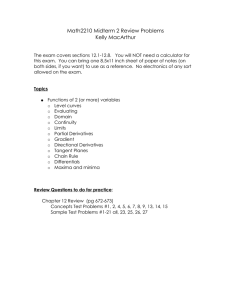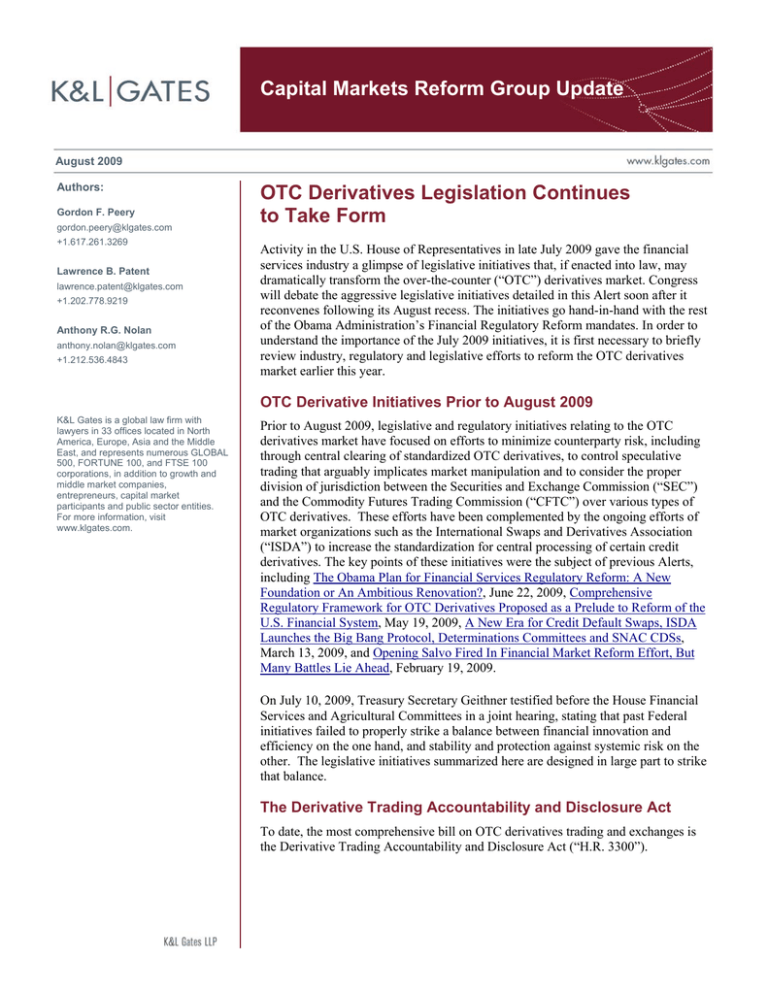
Capital Markets Reform Group Update
August 2009
Authors:
Gordon F. Peery
gordon.peery@klgates.com
+1.617.261.3269
Lawrence B. Patent
lawrence.patent@klgates.com
+1.202.778.9219
Anthony R.G. Nolan
anthony.nolan@klgates.com
+1.212.536.4843
OTC Derivatives Legislation Continues
to Take Form
Activity in the U.S. House of Representatives in late July 2009 gave the financial
services industry a glimpse of legislative initiatives that, if enacted into law, may
dramatically transform the over-the-counter (“OTC”) derivatives market. Congress
will debate the aggressive legislative initiatives detailed in this Alert soon after it
reconvenes following its August recess. The initiatives go hand-in-hand with the rest
of the Obama Administration’s Financial Regulatory Reform mandates. In order to
understand the importance of the July 2009 initiatives, it is first necessary to briefly
review industry, regulatory and legislative efforts to reform the OTC derivatives
market earlier this year.
OTC Derivative Initiatives Prior to August 2009
K&L Gates is a global law firm with
lawyers in 33 offices located in North
America, Europe, Asia and the Middle
East, and represents numerous GLOBAL
500, FORTUNE 100, and FTSE 100
corporations, in addition to growth and
middle market companies,
entrepreneurs, capital market
participants and public sector entities.
For more information, visit
www.klgates.com.
Prior to August 2009, legislative and regulatory initiatives relating to the OTC
derivatives market have focused on efforts to minimize counterparty risk, including
through central clearing of standardized OTC derivatives, to control speculative
trading that arguably implicates market manipulation and to consider the proper
division of jurisdiction between the Securities and Exchange Commission (“SEC”)
and the Commodity Futures Trading Commission (“CFTC”) over various types of
OTC derivatives. These efforts have been complemented by the ongoing efforts of
market organizations such as the International Swaps and Derivatives Association
(“ISDA”) to increase the standardization for central processing of certain credit
derivatives. The key points of these initiatives were the subject of previous Alerts,
including The Obama Plan for Financial Services Regulatory Reform: A New
Foundation or An Ambitious Renovation?, June 22, 2009, Comprehensive
Regulatory Framework for OTC Derivatives Proposed as a Prelude to Reform of the
U.S. Financial System, May 19, 2009, A New Era for Credit Default Swaps, ISDA
Launches the Big Bang Protocol, Determinations Committees and SNAC CDSs,
March 13, 2009, and Opening Salvo Fired In Financial Market Reform Effort, But
Many Battles Lie Ahead, February 19, 2009.
On July 10, 2009, Treasury Secretary Geithner testified before the House Financial
Services and Agricultural Committees in a joint hearing, stating that past Federal
initiatives failed to properly strike a balance between financial innovation and
efficiency on the one hand, and stability and protection against systemic risk on the
other. The legislative initiatives summarized here are designed in large part to strike
that balance.
The Derivative Trading Accountability and Disclosure Act
To date, the most comprehensive bill on OTC derivatives trading and exchanges is
the Derivative Trading Accountability and Disclosure Act (“H.R. 3300”).
Capital Markets Reform Group Update
H.R.3300 was introduced by Congressman Michael
E. McMahon (D-NY) and co-sponsored by the other
Members of Congress comprising the leadership of
the centrist New Democratic Coalition. The
principal changes that would be brought about by
this proposed legislation include:
•
The establishment of the Office of Derivatives
Supervision within the Department of the
Treasury (“Office of Derivatives Supervision”);
•
The registration, qualification, and supervision
of “registered derivatives traders” and the
authorization for the imposition of sanctions
against any unregistered derivatives trader that
closes derivative transactions;
•
The trading on central clearinghouses and
warehousing of OTC derivatives;
•
Liability and rights of enforcement for
deviations from the law governing derivatives;
and
•
The establishment of an international working
group of regulators of derivatives to bring about
a cohesive regulatory regime that would obviate
forum shopping for derivatives activities.
The Office of Derivatives Supervision would
oversee derivatives traders and coordinate derivative
initiatives and regulation by the SEC and the CFTC
so that a more cohesive and comprehensive
regulatory OTC derivatives regime would develop
over time. The office would also bring about the
exchange of trading data and other information that
is needed (and has been lacking) for future
derivatives regulation. Authority is specifically
granted under H.R. 3300 to both the CFTC and SEC
to impose civil penalties and issue cease and desist
orders as well as orders for an accounting and
disgorgement.
Key components of earlier legislative efforts
included mandates for certain “standardized”
derivatives to be centrally cleared, but those efforts
largely stalled because of the difficulty in
determining what “standardized” derivatives are
with any degree of precision. H.R. 3300 handles
that problem by charging the SEC and CFTC with
the responsibility of developing (in coordination
with the Office of Derivatives Supervision)
determinations and guidelines for identifying
standardized derivatives that must under the bill be
centrally cleared. Customized derivatives are to be
processed through an OTC derivatives depository.
Earlier legislative efforts did not call for the
extensive regulation of those individuals who trade
derivatives in the way that H.R. 3300 does. This
bill would establish registration requirements for
those trading in the derivatives market;
requirements include registration with the Treasury
Department as well as compliance with disclosure
and reporting requirements. These measures, if
enacted into law, would potentially reshape the
practice and culture of the OTC derivatives market.
To date, H.R. 3300 is in the early stages of the
legislative life cycle; it has been referred to the
House Financial Services and House Agriculture
Committees. While Rep. McMahon is a relatively
junior Member of Congress, this bill could
ultimately represent an important piece of the
legislative history because as the first Democrat to
hold the Staten Island seat in 30 years he can expect
the House leadership to be helpful to him.
Furthermore, he has a close perspective on the
financial markets because many of his constituents
work on Wall Street.
Transparent Markets Act of 2009
While not nearly as comprehensive, the Transparent
Markets Act of 2009 (“H.R. 3153”) is worth
mentioning because it would for the first time
impose a tax on OTC derivatives transactions.
H.R. 3153 was introduced by Congressman John B.
Larson (D-CT) and has been referred to the House
Ways and Means Committee.
H.R. 3153 would amend the Internal Revenue Code
of 1986 to impose a tax on OTC derivatives
transactions in an amount equal to 0.25% of the fair
market value of the underlying property with
respect to, or the notional principal amount of, the
derivative financial instrument involved in such
transaction. All parties to a covered derivative
transaction would be jointly and severally liable for
the tax imposed on such transaction by the proposed
legislation. Transactions subject to this tax would
include any option, forward contract, short position,
notional principal contract, credit default swap, or
similar financial instrument referencing any share of
August 2009
2
Capital Markets Reform Group Update
stock in a corporation, partnership or beneficial
ownership interest in a widely held or publicly
traded partnership or trust, note, bond, debenture, or
other evidence of indebtedness, “actively traded”
commodity, foreign currency, or an index based on
any combination of a fixed or variable rate, a price
or an amount.
Financial Services Oversight Council, a new body
that would be comprised of the heads of the major
regulators. Jurisdiction for the regulation of the ICE
Trust credit default swap clearinghouse would be
shifted from the Federal Reserve to a market
regulator within six months following the date on
which enabling legislation becomes law.
The Concept Paper
The Concept Paper also indicates that legislation
will call for OTC derivatives to be reported to a
trade repository. Similar to H.R. 3300, the Concept
Paper calls for registration requirements for dealers,
clearing of derivatives that are currently OTC
derivatives, and more expeditiously approving and
providing incentives for the use of electronic trading
platforms. Additionally, margin and capital
requirements are to be developed by either or both
of the SEC and CFTC; such requirements are to be
more stringent for “non-standardized” derivatives
that are not exchange-traded or centrally cleared.
The Concept Paper provides enforcement authority
and calls for enhanced oversight of speculative
positions.
Also in July 2009, key House of Representative
leadership, House Financial Services Committee
Chairman Barney Frank (D-MA) and House
Agriculture Committee Chairman Collin Peterson
(D-MN), reached agreement in a concept paper (the
“Concept Paper”) that calls for the SEC or CFTC (or
both) to oversee the regulation of OTC derivative
dealers, exchanges and clearinghouses.
The guideposts for future legislation included in the
Concept Paper are as follows: robust oversight of
dealers and markets; mandatory clearing of OTC
derivatives, with exceptions; strengthening capital
and margin requirements; reining in certain
speculation; preventing regulatory arbitrage;
establishing a Financial Services Oversight Council
that would promptly resolve disputes; and
enforcement of new and existing laws and
regulations governing OTC derivatives.
The underlying asset of any given derivative will
determine the jurisdiction of regulation by the CFTC
and SEC, according to the Concept Paper that was
jointly released by Representatives Frank and
Peterson. Jurisdictional issues and disputes are to be
resolved by both regulators in coordination with the
Conclusion
The Senate and House of Representatives are next
in session on September 8, 2009. Work by House
leadership on H.R. 3300 and other derivatives
legislation that is guided by the principles included
in the Concept Paper will likely begin soon
thereafter. In the event that you have questions
concerning this Alert, please contact the authors.
Anchorage Austin Beijing Berlin Boston Charlotte Chicago Dallas Dubai Fort Worth Frankfurt Harrisburg Hong Kong London
Los Angeles Miami Newark New York Orange County Palo Alto Paris Pittsburgh Portland Raleigh Research Triangle Park
San Diego San Francisco Seattle Shanghai Singapore Spokane/Coeur d’Alene Taipei Washington, D.C.
K&L Gates is a global law firm with lawyers in 33 offices located in North America, Europe, Asia and the Middle East, and represents numerous
GLOBAL 500, FORTUNE 100, and FTSE 100 corporations, in addition to growth and middle market companies, entrepreneurs, capital market
participants and public sector entities. For more information, visit www.klgates.com.
K&L Gates comprises multiple affiliated partnerships: a limited liability partnership with the full name K&L Gates LLP qualified in Delaware and
maintaining offices throughout the United States, in Berlin and Frankfurt, Germany, in Beijing (K&L Gates LLP Beijing Representative Office), in
Dubai, U.A.E., in Shanghai (K&L Gates LLP Shanghai Representative Office), and in Singapore; a limited liability partnership (also named K&L
Gates LLP) incorporated in England and maintaining offices in London and Paris; a Taiwan general partnership (K&L Gates) maintaining an office in
Taipei; and a Hong Kong general partnership (K&L Gates, Solicitors) maintaining an office in Hong Kong. K&L Gates maintains appropriate
registrations in the jurisdictions in which its offices are located. A list of the partners in each entity is available for inspection at any K&L Gates office.
This publication is for informational purposes and does not contain or convey legal advice. The information herein should not be used or relied upon
in regard to any particular facts or circumstances without first consulting a lawyer.
©2009 K&L Gates LLP. All Rights Reserved.
August 2009
3

